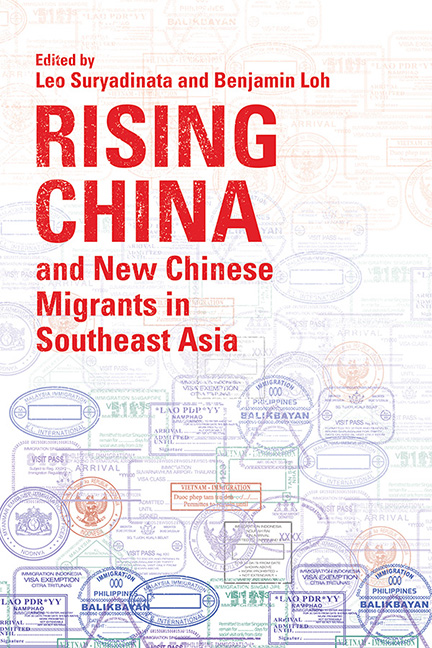Book contents
- Frontmatter
- Contents
- About the Contributors
- Introduction: Rising China and New Chinese Migrants in Southeast Asia
- Part I General Overviews on Rising China and Xin Yimin
- Part II China’s Soft Power, Xin Yimin and Local Communities
- Part III New Chinese Migrants and Local Communities
- Part IV New Chinese Migrants and Local Economies
- Index
14 - Casino Capitalism, Chinese Special Economic Zone and the Making of a Neoliberal Border in Northern Laos
Published online by Cambridge University Press: 09 January 2024
- Frontmatter
- Contents
- About the Contributors
- Introduction: Rising China and New Chinese Migrants in Southeast Asia
- Part I General Overviews on Rising China and Xin Yimin
- Part II China’s Soft Power, Xin Yimin and Local Communities
- Part III New Chinese Migrants and Local Communities
- Part IV New Chinese Migrants and Local Economies
- Index
Summary
We hope that this will be a [future] collaboration [between three countries]. When the special economic zone in Thailand connects with the zone here and when the political situation in Myanmar has improved so that the country can develop with their own style and natural resources, we will build a bridge on the Mekong river. It will be a 人 shape bridge, with Laos on the top, Thailand on the left, and Myanmar on the right. It will be a tourist bridge that shows to the world that we have done good deeds here, and that Golden Triangle has already changed.
Laos used to suffer tremendously from various causes. But with the effort by Kings Romans, this place has become peaceful and clean.
(Zhao Wei, Owner of Kings Romans Company)On 7 January 2014, a bulldozer was sent by a Chinese firm—the Kings Romans Company, which runs the Golden Triangle Special Economic Zone—to clear land to construct an international airport in Ton Phueng district. An area of 236 hectares of rice fields had already been taken by the company from forty-one families, but the villagers refused to accept the offered compensation as it was well below market value. Though the original land dispute was not yet settled, Kings Romans demanded an additional 6 hectares of land to complete its construction. Refusing to comply with the perceived unfair deal, a group of farmers who had cultivated the area for several generations protested in front of the bulldozer, prompting the company to seek intervention from the Lao police. Policemen armed with AK-47 assault rifles were sent to enforce the order by Kings Romans, resulting in a stand-off between villagers and government officials. This was a rare protest by citizens against a developmental project in post-Socialist Laos.
The case of Ton Phueng is just one among many throughout the Lao PDR of local communities similarly affected by the government’s Special Economic Zones (SEZs), defined as the creation of large-scale zones of fenced-in industrial estates to attract foreign direct investments. Since the 2000s, Laos has followed its Chinese neighbour in creating SEZs to serve as a new economic engine where special economic policies and flexible governmental measures conducive for business can be implemented.
- Type
- Chapter
- Information
- Rising China and New Chinese Migrants in Southeast Asia , pp. 270 - 292Publisher: ISEAS–Yusof Ishak InstitutePrint publication year: 2022

